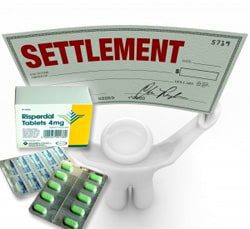
Johnson & Johnson is close to a settlement with the feds over how it marketed antipsychotic medication, Risperdal. The antipsychotic has been linked to a number of adverse health reactions. The potential settlement is in the $1.5 – $1.7 billion range over Department of Justice prosecutor claims over how the drug maker resolved allegations against […]
 Johnson & Johnson is close to a settlement with the feds over how it marketed antipsychotic medication, Risperdal. The antipsychotic has been linked to a number of adverse health reactions.
Johnson & Johnson is close to a settlement with the feds over how it marketed antipsychotic medication, Risperdal. The antipsychotic has been linked to a number of adverse health reactions.
The potential settlement is in the $1.5 – $1.7 billion range over Department of Justice prosecutor claims over how the drug maker resolved allegations against one of its subsidiaries that it used bogus marketing ploys for the schizophrenia drug, said RTT News, citing a Wall Street Journal report. An agreement is expected in the next couple of weeks.
Federal prosecutors rejected a tentative $1 billion settlement in mid-March and are working toward a stronger settlement, which will close numerous lawsuits, some state investigations, and other probes, said RTT News The feds are rumored to be seeking a $2 billion settlement and the drug maker is looking to avoid a felony charge, which could prevent Johnson & Johnson from selling its drugs to Medicare and other government health programs. Risperdal lost its United States patent protection in 2008.
From 1999 to 2004, Janssen Pharmaceuticals, Inc., a Johnson & Johnson unit, allegedly employed illegal methods to urge Medicaid health program officials to spend millions of dollars on Risperdal, said RTT News. Johnson & Johnson has been the focus of investigations over alleged off-label promotion of Risperdal and another schizophrenia drug, Invega, to nursing-home pharmaceutical operators, said RTT News. Activities include nursing home residents and allegations include bribes, including a bribe to pharmaceutical benefits manager Omnicare, Inc. (OCR), to prescribe Risperdal for unapproved uses, such as for dementia and Alzheimer’s.
Janssen is also accused of recommending Risperdal for the treatment of children, despite that the U.S. Food & Drug Administration (FDA) has only approved the drug for adult schizophrenics, said RTT News. Allegations also include that Janssen misled Medicaid officials to give bias to Risperdal over other drugs, despite that there was no difference in the drugs’ effectiveness, and to have significantly overpriced the drug over competitor versions.
To date, the courts have ordered Johnson & Johnson to pay more than $1.9 million to judgments in a number of state courts over illegal Risperdal marketing.
We recently wrote that the health care giant lost an Arkansas Risperdal lawsuit in which it was accused of minimizing and hiding risks linked with Risperdal, said a jury in the billion-dollar lawsuit. The plaintiff’s attorney sought fines of upwards of $1.2 billion for some 250,000 million Risperdal prescriptions in Arkansas’ Medicaid program that were paid over the course of 3 ½ years. Texas also sued over Risperdal, reaching a $158 million settlement with Janssen, which admitted no fault.
Antipsychotics are approved for serious psychiatric conditions; however, the drugs can be used at physician discretion and are being used for a range of disorders. Some of these other uses have seen recent approval by the FDA; many have not. We’ve long written about the links between antipsychotic medications and a number of adverse reactions, including reactions linked to Risperdal and a lack of proof of efficacy and associations with some serious side effects.
Atypical antipsychotics have been the focus of thousands of lawsuits; the drug class is also the single, largest spotlight for lawsuits filed under the federal False Claims Act. Every key drug company selling atypical antipsychotics has either settled lawsuits in the hundreds of millions of dollars or are the subject of probes concerning the massaging of results or use of questionable marketing.


